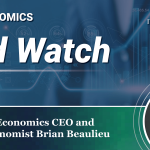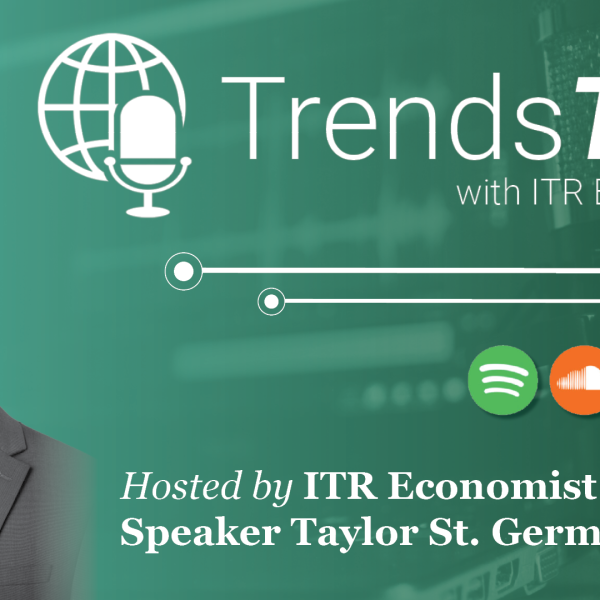- Mon - Fri: 8:30 - 5:00
- +1-603-796-2500
- ITR@itreconomics.com
June 10, 2024
- Home
- portfolio
- TrendsTalk
- June 10, 2024
with Taylor St. Germain
ADVICE FOR NAVIGATING THE ECONOMY: WITH SPECIAL GUEST STEVE BAKER
This week on TrendsTalk, host Taylor St. Germain is joined by The Great Game of Business Vice President Steve Baker to share key advice on how to chart a course through today’s economic headwinds with data and a vision for your business.

MEET YOUR HOST
Taylor St. Germain
As an experienced economist, Taylor St. Germain provides consulting services for small businesses, trade associations, and Fortune 500 companies across a spectrum of industries. His dynamic personality and extensive knowledge of economic trends and their business relevance are highly valued by clients and colleagues alike.
“Join me on the TrendsTalk podcast to explore the world of economics. Episodes offer insightful discussion and expert interviews. We cover relevant economic concepts in an accessible way. Whether you are a curious layperson or an industry professional, TrendsTalk is your go-to source for thought-provoking analysis and a deeper understanding of the economic forces shaping our world.”
Key Episode Takeaways
- 0:10 – Introduction to Steve Baker
- 1:38 – Three key pieces of advice for navigating the current economic environment
- 3:43 – Common issues clients face
- 10:15 – The need to embrace change and prepare for upcoming changes in the business cycle
- 13:14 – Why ITR Economics’ unique methodology is so reliable
- 18:33 – Re-emphasizing important advice for 2024 and 2025
- 21:07 – Conclusion
The below transcript is a literal translation of the podcast audio that has been machine generated by Notta.
Taylor St Germain:
Hi everyone, my name is Taylor St. Germain with ITR Economics, and thanks for joining me on this episode of TrendsTalk. We at ITR Economics are your apolitical and unbiased source of economic intelligence. And today we had a special guest on the podcast with Steve Baker, who is the vice president of the great game of business and also an author and public speaker. We work very closely, we at ITR work very closely with the great game of business and are very appreciative of the partnership that we have with them. We’ve interacted with the great game of business at conferences and with our clients over the past few years. They’re a great resource for you. We learn a lot from them. And I hope you learn a lot from my conversation here with Steve. Here’s my conversation with Steve and I hope you enjoy. Hi Steve, thanks so much for joining us here today.
Steve Baker:
Well Taylor. It’s awesome to be here. I love doing work with IT Economics.
Taylor St Germain:
Well, we really appreciate it. I want to jump right in. I know your time’s valuable. And we’d love to get your insight. So I’ll jump right into the first question that I have for you here. And that’s, you know, as we face this economic environment this year, what are the top three pieces of advice that you’re sharing with your clients as it relates to navigating the economy and really some of the headwinds we’re facing this year.
Steve Baker:
Yeah, absolutely. Well, it’s probably not much different than than you would advise people. The first one is ignore the media. I mean, it is like, it’s insane out there. And so you can’t find well, if you find some news outlet, it’s actually news, I would really like to know what it is. And so you guys have taught me since 2014, when I think I first read Alan and Brian’s book, that, you know, we need to find good resources for our information. So number one is ignore the media. Number two is both find your data, meaning, IT or economics, look at your industry associations, not only look at your data, but understand it. And so here, at SRC and the great game of business, we’re very much market based reality based in our approach to business and business strategy and planning. So if you do those things, you’re going to be looking at the numbers in a different way. And you do have to teach your team. And I mean, from executives on, right, it’s not just an assumption that every executive is going to understand what it is, because we all bring our, our head trash, you know, to the party.
Third piece, so it’s, you know, ignore the media, get your own data and understand it and teach your people. And then the other one is to take some kind of action. I mean, to me, that is the thing that’s gumming everybody up. A lot of people are paralyzed with fear. And and so for me, the the action, any action can be a cure for fear. I’ve even run into some people, we have a couple of coaches are like, you know, any decisions probably better than no decision. I’m not certain I would recommend that to everyone if they don’t have a history or track record of great decisions. But you know, there’s something to be said for getting off the block.
Taylor St Germain:
Really two questions here but I think they’re similar which is some of the common issues you’re seeing across clients right now and maybe how the economy factors into those issues. I think those two questions are somewhat intertwined there but I figured I’d give you give you both because I think
Steve Baker:
I love it. I mean, then we could go deep as you want to go here, man. But margin compression seems to be a really big one for a lot of people. So we’re looking at a lot of the clients that I’m working with and also the audiences I’m speaking to are really complaining about interest rates. Well, I mean, we all are right about inflation as an example. But if we add it all up, those increasing costs and the tougher—look, you guys are the ones that advised everyone last year. If you haven’t gotten your price raises in, by the end of the year, you’re probably not going to get it. And I know a lot of people just waited too long. So margin compression would be one.
I think talent’s the other big one. And I’d like to address that in a way because you said, well, how does the economy play into it? And I know that I think you all had done a bit of a tweak on the numbers where it was two to one jobs for people, and now it’s three to two if I’m not remembering that incorrectly. And so in a way, you’d say, you know, well, it’s getting better, but it’s still going to be a tight labor market. That’s just the way that it is. And so I think that people that I run into have been almost afraid to admit how good they’re doing. And so they look at—I think there’s a lot of tentativeness around, oh, it’s an election year. There’s war. There’s conflict worldwide. And so that all plays into the economy. To me, the economy plays in if we can look at it with reality, which you guys help us do, which is to say, when do I get off the sidelines? When do I jump in? When do I invest in things that I need to invest in to build a great company? And that’s what you’re going to have to do is build a great company. The stuff you make, the services you provide are not what you’re all about. The company is actually the product. So focus on building that.
Taylor St Germain:
Yeah, I mean, you know, it’s funny you mentioned that America gained market share this last year, you know, we expanded our distance in terms of being the largest economy over this last year. So yeah, I think that feeds into the misinformation. And I think the labor part that you’re mentioning is so important, because exactly, you know, I look at that ratio, and you’re right that about, you know, three to two ratio, but another way to look at it for every one job opening, there’s only point seven people, right, that’s that ratio you’re talking about. And so we need to find ways to get our workforce more engaged, because we were going to need them with this labor shortage. During the down year when industrial productions in a recession, recession, it’s so unusual to see the labor force still this tight, the labor market still this tight. And so I think that’s why we really need to embrace ways to make these workers more efficient, with a lot of our automation innovation, robotics, artificial intelligence. But we really need to get this younger workforce excited about, you know, participating here in the future, because with the baby boomers retiring, we’re going to need everyone we can get.
Steve Baker:
Yeah, and that’s that was my point. Thank you for clarifying that, Taylor, because I believe that because I still feel I’m 20 in my head. Right. I mean, that’s where I’m at. But I also understand that in reality, my programming, whatever you want to call it, how I was raised, it’s different than next gen. So I have to be the guy who says, okay, I’m telling you right now, folks, it isn’t just artificial intelligence, it’s financial intelligence, because millennials in particular have a lower financial acumen, according to all the research that we’ve done, then the baby boomers, and then Gen X. What I’m suggesting to you is, is that let’s teach them that America doesn’t suck as much as they thought, and that it’s a great place for opportunity, for growth, and with all of those baby boomers, I’m on the cusp, you know, I’m just like to say that for the record, that as we exit, holy cow, that’s a lot of opportunity. So what are you gonna do? If you’re gonna really be like where our mission is, is to close the gap between the haves and have nots by teaching people the secret, and that’s financial information, and education, and understanding, if we don’t do that for our coworkers, our kids, our peers, et cetera, we’re probably looking at a lot of people who will just be dragging along, kind of going, well, it just happened. No, no, no, we can’t take that. So,
Taylor St Germain:
Yeah, you know, that’s how I we, you know, we don’t call it the Great Depression anymore, because there’s nothing great about economic downturns. But you know, I guess the other side of that equation, and what I share on stage a lot is, if you’re prepared for a recession, depression, any type of economic downturn, it can be one of the most profitable times that you experience, or one of the times where you can grow your market share in the most meaningful way, right. And that’s what I share with everyone is, hey, we have five years of economic growth in the second half of this decade, according to our forecast. And so you have five years to be making investments now recoup those investments, find yourself in a low leverage situation and build this cash. And if you have these resources to deploy in the 2030s, you’re going to be buying businesses for half the cost or half the valuation they are now, you know, people probably additional equipment, you know, we still have a client that was prepared for 0809, because they were working with us. And they still send us a thank you every year because of how cheap they were able to replace all their equipment, because they had cash ready to do that at the bottom of the cycle, right.
And so that’s what it’s so important. I think your point is exactly we can be afraid of this and continue life as is. But if we really attack this thing, and, you know, live a little below our means, build up that that wealth, you know, even an individual like me, I’m thinking, hey, great time for my second house in 2030, if I take the time to prepare, right. So I think there’s so much to be excited about, even though it is a challenging time, but it’s all about that preparation leading up to it.
Steve Baker:
Yeah, my brother-in-law bought a house in Key West in 09 because someone was leveraged too much. He had the cash and I’m just like going, I look back, you can Zillow it now and it’s a couple million bucks. You know, I’m like, oh my God, I know what he paid for that. He’s not that smart. I hope he doesn’t watch this, but you know what I’m saying? It’s like, oh my God. No, I’m just like, I’m amazed at what can happen when you’re prepared. And I love that story that you told and people should be thanking you because this is information.
So here’s a pro tip for everybody watching and listening now. And that is, take all this in, make your plans and don’t tell anyone about it or economics or the great game of business. And you’re going to rock it, man. But I would like to say something else because something happened last weekend that I haven’t really spoken on stage or anything yet. It just happened. But you know, I think a lot of people are waiting for something that isn’t coming. I don’t mean 2030. What I mean is like they’re hanging on, they’re sitting on the sidelines, they’re waiting to invest in that sort of thing. And you know, whether it’s lower interest, lower inflation, easier labor market, whatever it is, but I think they might be missing something. I don’t think they know any better. Many of our clients weren’t born in the 70s, maybe even the 80s. Many of my clients, you know, that they don’t remember the 90s. I don’t remember the 80s. But hey, look, let’s not even get into that.
But here’s the thing is, my kids, they’re 20 somethings. They don’t know what a recession is. Because we protected them from it as parents. And so now I’m going, I’m working so hard to teach them about what you guys teach, but in a way that they can take it in. And they are, they are. But here’s the thing that happened last weekend. Talk to my mom and dad, they’re 89. And I asked them straight up, said, How did you guys live? Because back then I looked it up. 12% inflation, 17% unemployment, they had an 18% mortgage. Dude, how did you even sleep at night? Mom said, we didn’t know any different. Dad said, entrepreneurs, true entrepreneurs will always find a way. And they ran a business and raised five of us. We didn’t know any different. I had a great childhood. And you know, what can I say is, let’s go back to, we got a normal here, get off the sidelines, stop waiting for something. Now’s the time. Don’t miss the 2526 train. Because if you have that talent that you’re thinking about hiring, and you have to pay for it, invest. If you got to put in that new machine or new system, that new tech, do it because if it takes a year to get them on board, or get them up to speed or to get that system in place, whatever, holy cow, is it 2026 already? So great advice you guys are giving and I’m following it and I’m passing it along as well.
Taylor St Germain:
Yeah, and we appreciate that. And I think you’re already getting into the next question I had for you, which is, how have you seen our methodology help some of your clients, and how have you maybe employed some of this, the rate of change methodology, the leading indicator methodology.
Steve Baker:
Yeah. So I will tell you this, knowing that you have clients that have been working with you for many years, and somebody who’s sending you thank you notes, I’m so jealous in a way. But I’m sure glad we found you when we found you because starting in 2009, you can imagine again, and we’re in the re manufacturing sector. So it’s ag construction, you know, trucking, automotive, defense, all that stuff, right, all different kinds of sectors. When we look at it, we got hit really hard. But we said, jack stack led us through this process, he first said, we’re going to take fear out of the organization.
So here’s the facts. The next thing is, we’re going to make sure that the jobs that are here are secure. And so that was the next step that takes more fear out. And then it was, no matter what happens, we’re going to grow the business, but at the same time, we’re going to build a work chest of $100 million in cash. So that by 2019, because we know it’s going to break again, right, the world seems to break every 10 years. And it’s like, we’re going to be ready for the next recession.
And with your help, we also forecasted that now what’s interesting is we made it. But you know what happened in 2019. It’s like, ever heard of Wuhan? I think we all have now. And we were prepared in a way that we never would have been prepared for a pandemic. Because, man, having cash helps you through a lot of different things. And when other people were suffering, we’ve gone 40 years without a layoff. I think that’s unprecedented. And to go through that situation, knowing that that wasn’t even our worry, our worry was how are we going to grow during a tough time. And a pandemic was another time where we sat down and Jack got to all of our people not only in the company, but in our community at great game of business. So thousands and thousands of people saying, it’s time to take fear out. And this is how we’re going to do it. Let’s get the facts. You guys came in, right as part of that equation. So for us, it was building war chest. And we saw how that worked. And we’re doing it again.
Other people, some are building war chest, some are working on their competitive advantage. Others are growing through acquisition right now, because they do have cash. And they’re saying, it might not be the best market to buy in, but it’s better than it was. And we’re not sure what’s going to happen next. So let’s go ahead and grow because they want to be super positioned to dominate in their industries in tough economic times. So I think one of the things you mentioned talent, and how much talent will become available in between 2030 and 2036. I mean, really, I’m like, I’m thinking the same thing, like the best talent in the world will be there for the picking. And I believe that building the stickiest culture that you possibly can, that’s why people come to us with Great Game of Business is, you know, that’s one of the things we do very well.
With your data, with our applications, I look at us as like the last mile, you take us all the way through the macro, and then we get into the micro and say, Well, how do you do that? Now? What does execution look like? That sticky culture is going to be building all the way up to 2030. And if you can build a resilient, anti fragile organization where people are going, we knew it was coming. And I’m okay, actually, I’m okay at home, too. You know, that I mean, just okay, is all I’m looking for. It doesn’t have to be perfect. You guys have written beautifully, by the way, about how the 2030s will not be like the 1930s. That has helped me a lot personally, dude. Seriously, thank you. I don’t want to thank Brian, of course. But yeah, the key is, what are we doing with it all? And can we be ready when when that turbulence hits?
Taylor St Germain:
Yeah, yeah, absolutely. And, you know, I think that’s a lot of the conversations we’re having with our internal clients is exactly that. You know, if it’s how do you listen, it’s 24 – 25 Yeah, things will be a little slower this year, and then we’re going to take off. So if you have this war chest, if you have the talent, and Jack actually said at the last meeting we were at last conference, he said, I believe whoever wins talent is going to win this next decade. And, you know, it’s I think it’s so spot on. So there’s in, you know, I think I appreciate you highlighting how we can help there. Because when it, you know, these are all things that we forecast on a regular basis, and really look at talent, we look at, you know, cash interest rate of perspectives, when are some of these best times, I think the timing perspective is so important with ITR as you violated here as well. So we really appreciate that you’ve given us a lot of advice throughout this conversation already. But if you had to pick maybe one or two major themes that you’re talking about for 24-25 is terms in terms of advice you’re giving your own employees within the company or businesses you’re working with, what would maybe those one or two big items be?
Steve Baker:
Well, I’ll start with the data again, just to say, like you mentioned, the rate of change and that sort of thing. People need to not just go, hey, what does ITR say? Because honestly, you can be passive about it. But to really calculate your own rate of change, Taylor, that’s harder than it looks at first. And then it gets easier. But understanding it is the other part. How are you going to use that and teach your people? So it is about get the data and start educating. Your first year leadership team and then your people, that would be one of the big ones is get the right data and then know where it’s coming from and then keep up with it. And then my other big one, this is, I mean, this is our mantra. It is build a great company. The company is the product. So if you focus on all the things that are in your way of being a great company before 2030, in other words, we have some debt, pay it off. We’re a little lacking in talent. Go get it. All those things. Anything that if you just identify what makes a great company and you look at your balance sheet and you look at your team and you say, well, these are the things that a great company probably would do better at.
Work on those things. You have what, three, five years, somewhere in there, whatever that magic number, that’s enough. That’s enough time to get ready. And you will be, you’ll be powered up, you’ll be low debt, you’ll be great talent and you’ll be positioned to take advantage when everyone else is panicking. And as Warren Buffett said, you know, buy when there’s blood in the streets, not your own, right? Wow, it’s cold, but it isn’t because I’m telling you, man, if it has to be that way, I’d rather that me, my team, my family, my kids, that they are the ones that also take advantage of that because even though, what did you say, $27 trillion? Did I hear that run number right? $21 trillion, do you know how fast that will dwindle away if it’s used incorrectly? People are waiting to take that away from the next generation, right? One way or another, they’re just looking for a way. And so if something’s gonna be good, some is gonna be nefarious, but the fact is, it will be taken away if you don’t know what to do with it. So get smart and build that great organization. And Taylor, that’s one of the reasons why we’re sponsoring the executive series webinar where Alan and Brian will be kind of doing their last duet together. We’re pretty excited about that, not the breakup, but you know what I mean.
Taylor St Germain:
We really appreciate it, Steve. Thanks so much for being here today.
Steve Baker:
Anytime. Glad to be here.
Taylor St Germain:
Thanks so much for tuning in to this episode of Trends Talk. Please remember to like and subscribe to TrendsTalk wherever you listen to your podcasts. We’ll have more great content and guests coming your way. And I look forward to seeing you on the next one.






